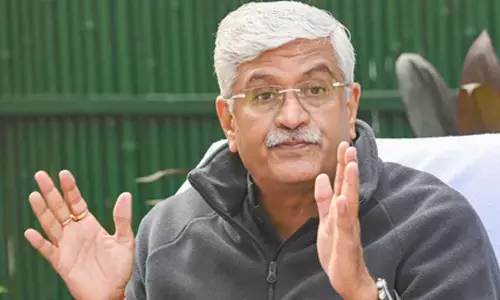Smartwatches, fitness bands can track individual's response to Covid vax
![smartwatches / fitness bands [Representational Image] smartwatches / fitness bands [Representational Image]](https://assets.thehansindia.com/h-upload/2022/04/20/1287938-smartwatches.webp)
smartwatches / fitness bands [Representational Image]
Wearable sensors, such as smartwatches and fitness bands, can reveal a person's physiological response to the Covid-19 vaccination, according to a study.
Wearable sensors, such as smartwatches and fitness bands, can reveal a person's physiological response to the Covid-19 vaccination, according to a study.
The study, published in npj Digital Medicine, analysed sensor data on sleep, activity and heart rate from over 5,600 individuals.
The findings showed that the average resting heart rate of participants significantly increased the day following vaccination, peaking two days post-vaccination, and returning to normal four days after the first dose and six days after the second.
The effect appeared to be stronger after the second dose of the Moderna vaccine, compared to the Pfizer-BioNTech vaccine, and more pronounced in younger individuals.
This suggests that prior Covid infection was linked with a significantly higher resting heart rate increase after the first vaccine dose relative to those without prior infection.
The increase is also consistent with an expected greater immune response for these individuals, the researchers said.
"Investigating the physiological signals in the period around vaccination can help us better understand the variability of vaccine response between people, as well as the changes from an individual norm due to vaccination," said lead author Giorgio Quer, director of Artificial Intelligence at the Scripps Research Translational Institute.
"As these individual changes are due to a person's initial immune response to the vaccine, they can potentially help guide future vaccine development to optimise their efficacy and safety, and allow for more precise, individualised vaccine regimens," Quer added.
The team drew their data from a larger project, called Digital Engagement and Tracking for Early Control and Treatment (DETECT) -- a mobile-app research platform that allows participants to share physiological and behavioural data gathered through a fitness band or smartwatch, as well as manually entered symptoms, test results and vaccination status.
The team analysed DETECT sensor data from two weeks before and after each vaccination dose. They compared post-vaccination changes to the participants' resting heart rate, sleep and activity levels, to their baselines.
Findings also show that women experienced greater changes than men in resting heart rate in the five days following vaccination after the first dose, and that individuals under the age of 40 had higher changes in resting heart rate than older individuals, but only after the second dose.
Activity and sleep patterns appeared to be minimally affected by the first dose, but a significant decrease in activity and an increase in sleep relative to baseline were observed immediately after the second vaccine dose.
"While the link between physiological response and immune response still requires further investigation, digital tracking could provide a novel way to identify individuals who may not be responding optimally to the vaccine," said Steven Steinhubl, Associate Professor at Scripps.

















